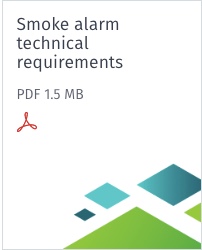THE ALARMING TRUTH
How Flawed Smoke Alarm Standards have Led to
Tens of Thousands of Needless Injuries and Deaths
Part 3
Chapters 18 - 25 | 2014 - 2018
Chapter
Date
Content
18
2014
June
Consumer Research - 'SILENT DEATH' - Housing N.Z. Alarms Fail
[CNZ: 3 of 4] All ionization alarms fail Consumer N.Z.'s third scientific study.
19
2014
Nov 10
60 Minutes Special Investigation: 'The Alarming Truth'
The Alarming Truth about the ionization smoke alarms in most homes.
20
2014
Nov 25
Housing N.Z. Warned - Ionization Smoke Alarms are Unsafe
Email message and 15 page report sent to Housing N.Z. senior management.
21
2015
Sept
Double Fatality in Housing N.Z. Home with Ionization Alarms
Ionization alarms that failed Consumer N.Z. testing installed in 64,000 Housing N.Z. Homes.
22
2015
Dec
FPAA Testimony: "Ionization Alarms are Not Fit For Purpose"
Fire Protection Association Australia (FPAA) testimony at Australian Senate Inquiry.
23
2016
July 1
New Zealand - World's First, Nationwide Photoelectric Legislation
Legislation mandates photoelectric smoke alarms in New Zealand rental dwellings.
24
2016
Oct 05
New Zealand Fire Service Misleads Coroner
WFSF testimony at Coronial Inquest exposes N.Z. Fire Service misrepresentations.
25
2018
May 05
Consumer Research - Ionization Alarm Warning on National Radio
[CNZ: 4 of 4] All ionization alarms fail Consumer N.Z.'s fourth scientific study.
Chapter 18
2014 | June
[CNZ: 3 of 4]
Consumer New Zealand (CNZ) Research:
'SILENT DEATH' - Housing New Zealand Ionization
Smoke Alarms Fail Consumer New Zealand Testing
All ionization alarms fail in Consumer New Zealand's third scientific study.
PART 4 | Chapters 25 onwards
xxxx 2020 - xxxx 20xx
Consumer New Zealand
Smoke Alarm Research | Series Three | June 2014
Consumer N.Z.'s Testing
IonizationSmoke Alarm Test Results
Conducted by:

The Building Research Association
of New Zealand (BRANZ) is
an independent, impartial
research, testing, consulting
information company.
BRANZ Scientific Research
for Consumer New Zealand
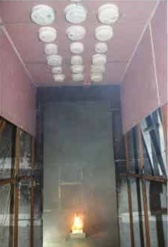
BRANZ Fire Laboratory
Judgeford, Porirua, New Zealand
"The ionization models were slightly better overall at detecting
flaming fires, but they were hopeless for smoldering fires."
'Silent Death' | Consumer N.Z. | page 19, para 6 | June 2014
The Ionization Alarms Installed in Over 64,000 Housing
N.Z. Homes Failed Consumer N.Z.'s Smoldering Fire Tests
Over 250,000 Universal Security Instrument's MDS300L ionization
smoke alarms that were installed in over 64,000 Housing New Zealand state
homes received the same score as all ionization alarms tested: '0 out of 10'.
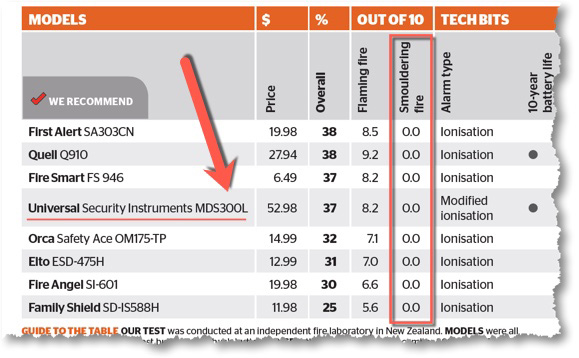
Extract: Consumer New Zealand Smoke Alarm Research Report | June 2014, page 2
MORE > > >
Extract: Consumer New Zealand's
'Silent Death' Smoke Alarm Research Report
RIGHT CLICK
DOWNLOAD
REPORT
1.3 MB
World Fire Safety Foundation Comments:
Consumer New Zealand's (CNZ) third smoke alarm research report, 'Silent Death' was published in June 2014.
The following extract is from the October 2019. 'Peer Review of Fire & Rescue NSW Smoke Alarm Studies':
'Peer Review of Fire & Rescue NSW Smoke Alarm Studies'
by Dr Vytenis Babrauskas | New York, USA | 29 October 2019
Quote by Greg Mullins, President of AFAC
the Peak Representative Body for all N.Z. Fire Brigades
"People have said that one is good for flaming fires (ionization) and one is..
good for smoldering (photoelectric). In my experience as a firefighter just..
about every fire I have ever been to started as a smoldering fire and went..
through a stage until it became a flaming fire. To say that they are equal..
and good for different circumstances is to me a fallacy, an absolute myth."
Greg Mullins, Commissioner FRNSW, President of AFAC | Australian Senate Smoke.Alarm Inquiry | Hansard Transcript | page 3, para 9 | 4 Dec 2015..

'Peer Review of FRNSW Smoke Alarm Studies' | Dr Vyto Babrauskas | Page 3, Para 3 | 29 Oct 2019
Important Conclusions from Consumer N.Z. Funded, BRANZ 2014 Research
"Some important conclusions can be drawn from these findings:
(a) Ionization detectors were essentially incompetent at detecting smoldering fires,
successfully alarming in only 15% of the tests.
(b) Photoelectric and multi-criteria detectors, by contrast, alarmed in 100% of the tests.
(c) All detectors were 100% successful in alarming during flaming-fire tests."
'Peer Review of FRNSW Smoke Alarm Studies' | Dr Vyto Babrauskas | Page 14, Para 3 | 29 Oct 2019
- All Universal Security Instrument's MDS300L ionization alarms failed the smoldering fire tests scoring 0 out of 10.
- Housing N.Z. (HNZ) purchased more than 250,000 ionization alarms after seeking advice from the N.Z. Fire Service.
- After the release of CNZ's report, what did the Fire Service and/or HNZ do to warn HNZ's tenants and the public?
- After two deaths in a HNZ home in September 2015 (15 months after the Consumer N.Z. report), the NZFS misled
a Coronial Inquest claiming that the ionization alarms were a combination ionization/photoelectric alarm.
- Consumer N.Z.'s report stated the MDS300L was an ionization alarm, NOT a combination ionization/photoelectric.
Double Fatality in Housing N.Z. State House Fitted with MDS300L Ionization Smoke Alarms HERE > > >
Consumer N.Z.'s Smoke Alarm Scientific Research
2006 | 2010 | 2014 | 2018

60 MINUTES
'THE ALARMING TRUTH'
THE ALARMING TRUTH - Trailer | 30 Seconds
“Why the smoke alarm in your home won't save you.”
THE ALARMING TRUTH - Part One | 8 Minutes
0:29 "As our special investigation reveals, Australia's (and New Zealand's) most
popular fire alarm, the one that's likely fitted in your home, is unlikely to save you."
Karl Stefanovic | 60 Minutes Reporter | The Alarming Truth | 10 Nov 2014
THE ALARMING TRUTH - Part Two | 10 Minutes
0:05 "But what I've just seen is shocking - a house
billowing with smoke and the fire alarm failing to go off."
Karl Stefanovic | 60 Minutes Reporter | The Alarming Truth | 10 Nov 2014
Australian Building Codes Board (ABCB)
Flawed & False Statements
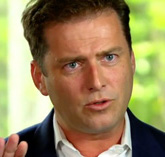
7:15 "Every study that been done of late has said that the photoelectric alarms gives you valuable minutes; valuable minutes on top of ionization alarms . . . It's good enough for most commercial buildings in this country, it's good enough for hospitals to be used, why wouldn't it be good enough to be used in households where people are most vulnerable?"
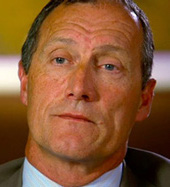
8:37 "It hasn't been
demonstrated to the Board's satisfaction that one performs
better in all circumstances
over the other.
The Board doesn't delineate between different types of products."
(emphasis added)
Karl Stefanovic
60 Minutes Reporter
Neil Savery
General Manager, Australian
Building Codes Board (ABCB)
See World Fire Safety Foundation Comments
EXTRA MINUTES | Frustration with Authorities Failure to Warn | 2 Minutes
0:36 "And the average consumer thinks he’s safe . . .
Not if he’s relying on an ionization smoke alarm..."
David Isaac | Australia's Leading Fire Safety Expert | The Alarming Truth | 10 Nov 2014
RIGHT CLICK
DOWNLOAD
TRANSCRIPT
.54 MB
World Fire Safety Foundation Comments:
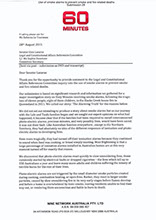
Industry Politics - Wasting Time and Risking More Lives
"It soon became clear that they (the Fire Service) actually did want
to help but were frightened and concerned at the industry politics
involved in this issue and the ramifications for them if they spoke
out - industry politics which are wasting time and risking more lives."
Rebecca Le Tourneau, Producer, 60 Minutes | Submission to the
Australian Senate Smoke Alarm Inquiry | 28 Aug 2015 | page 2, para 8
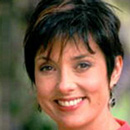
Read 60 Minutes' Submission
Rebecca Le Tourneau
Producer, 60 Minutes
60 Minutes Submission
to Australian Senate Inquiry
60 Minutes
We worked closely with Rebecca Le Tourneau providing technical assistance, video footage and rebutting fire service and
fire industry misinformation. After almost all fire brigades refused to help, the Foundation organized to have the testing done
in the U.S. However, at the midnight hour, the Northern Territory Fire Service agreed to help. Read 60 Minutes Submission
to the Australian Senate Smoke Alarm Inquiry expressing concerns with ionization alarms and industry politics.
Australian Building Codes Board's (ABCB) Flawed & False Statements
Flawed Statement: "It hasn't been demonstrated to the Board's satisfaction that
one performs better in all circumstances over the other." (Emphasis added)
Jurisdictions in Australia, N.Z. and the U.S. that have passed photoelectric-specific legislation, have done so because:
1) Photoelectric alarms perform considerably better than ionization alarms in most life-threatening fires,
2) Due to incessant false alarms, ionization alarms have an unacceptably high disconnection rate, and
3) Ionization alarms contain radioactive material, Americium-241. Photoelectric alarms do not.
False Statement: "The Board doesn't delineate between different types of products."
This statement was made after Karl Stefanovic mentioned how the ABCB had adopted legislation (AS1670.1-2014) into
the Building Code of Australia (this was in 2004) that mandated photoelectric smoke alarms in commercial buildings.
IMPORTANT
1) Read the WFSF's dedicated ABCB web pages which explains how the ABCB failed to adopt Standard Australia's
correction to Australia's flawed Smoke Alarm Standard. If the ABCB had adopted the proposed amendment
ionization alarms would not have been able to pass the amended standard.
2) Hear ABCB General Manager, Neil Savery defending ionization alarms in the Australian Broadcasting Corporation's
(ABC) Special Investigation which exposes ABCB funded, flawed testing of ionization alarms.
World Fire Safety Foundation Message:
Housing New Zealand Warned -
Ionization Smoke Alarms are Unsafe
Email message and 15 page report sent to Housing N.Z. senior management.
"The ionization type of smoke alarm in most New Zealand homes has
been proven by Australian government (CSIRO) and Consumer New
Zealand scientific testing (by BRANZ), to have life-threatening defects."
Adrian Butler, Chairman, WFSF in message sent to HNZ | 25 Nov 2014
WFSF Email Sent To Housing New Zealand
RIGHT CLICK
DOWNLOAD
EMAIL
.3 MB
WFSF Report Sent To Housing New Zealand
RIGHT CLICK
DOWNLOAD
REPORT
3.6 MB
Tokona Tragedy:
Double Fatality in Housing New Zealand Home With
New Zealand Fire Service Endorsed Ionization Alarms
The 'Iophic' ionization alarms that failed Consumer New Zealand's 2014 testing,
had been checked by the N.Z. Fire Service at the request of Housing N.Z. They were
installed in the homes of N.Z's most at risk families; i.e. in 64,000+ Housing N.Z. states houses.
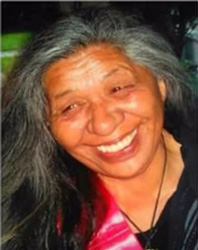

In September 2015, Bessie Tokona and Eunice Felton perished
in a Housing N.Z. home fitted with seven, hard-wired, working ionization smoke alarms endorsed by the N.Z. Fire Service.
The 'Iophic' brand ionization alarms in their state home had
failed Consumer N.Z.'s scientific testing published June 2014.
Tokona/Felton Tragedy | Palmerston North, New Zealand | Sept 15
Bessie Tokona (61) and her granddaughter Eunice Felton (6)
Ionization Smoke Alarm Victims


Fatal Palmerston North Fire: Bodies Believed
to be Grandmother and 6-Year-Old Girl Removed
". . .McKay said they had received word there were active smoke alarms in the house."
Kelsey Wilkie, Kirsty Lawrence and Tom Hunt | Manawatu Standard | 3 Sept 2015
World Fire Safety Foundation Comments:
June 2014 | Consumer New Zealand's Warning:
Ionization alarms, (fitted in over 64,000 New Zealand State Homes) failed smoldering fire tests in Consumer New Zealand testing (See CNZ's June 2014, 'Silent Death' Report). Consumer N.Z. has been conducting scientific research
on smoke alarms since 2006. All ionization alarms have failed all smoldering fire tests in all four series of tests:
Consumer N.Z. Smoke Alarm Scientific Research
2006 | 2010 | 2014 | 2018
10 Nov 2014 | 60 Minutes Warning:
'The Alarming Truth' ionization smoke alarm exposé aired across New Zealand warning:
"The (ionization) smoke alarm in your home won't save you."
25 Nov 2014 | World Fire Safety Foundation's Warning:
After 'The Alarming Truth' aired across New Zealand, the WFSF wrote to HNZ warning that:
"The ionization type of smoke alarm in most New Zealand homes has been proven by Australian government
(CSIRO) and Consumer New Zealand scientific testing (by BRANZ), to have life-threatening defects."
3 October 2016 | NZFS Misleads Coroner
The NZFS misrepresented the facts about smoke alarms installed in State homes at Tokona/Felton Coronial Inquest.
Fire Protection Association Australia Testimony:
"Ionization Smoke Alarms are Not Fit For Purpose"
FPA Australia's Testimony at Australian Senate Smoke Alarm Inquiry
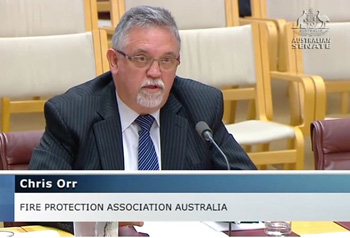
MORE > > >
"Again, it (the ionization alarm) is not fit for purpose."
Chris Orr, Technical Director, FPAA | Australian Senate Inquiry
Canberra, Australia | 4 Dec 2015 | Hansard - Page 14, Para 3
"If I get an alert, I get woken up and I want to find my way to
the exit, I have got to be able to see the exit. At 50 to 60%
obscuration, if an ion did go off, then you are not going to
see it. Again, it is not fit for purpose."
Mr Chris Orr, Technical Director
Fire Protection Association Australia
Products Not Fit For Purpose:
Litigation and Life-Safety Concerns

Fire Protection Association Australia (FPA Australia) is the national peak body for fire safety, providing information, services and education to the fire protection industry and the community.
Legislation - New Zealand:
The World's First, Nationwide
Residential, Photoelectric Legislation
Photoelectric smoke alarms mandated in New Zealand rental dwellings.
From 1 July 2016 All New Smoke Alarms In All New Zealand Rental Homes Must:
- Be photoelectric,
- Have a battery life of at least eight years, or be hard-wired,
- Be installed according to the manufacturer’s instructions, and
- Meet international standards.
Note: Failure to Comply is an Unlawful Act and Could Result in a Financial Penalty of up to $4,000
Information extracted from the New Zealand Government's Ministry of Business, Innovation & Employment website 4 August 2019:
www.tenancy.govt.nz/maintenance-and-inspections/smoke-alarms
New Zealand Government Advice:

Residential Tenancies Act 1986
(PDF 1.1Megs)

Coronial Inquest:
New Zealand Fire Service Misleads Coroner
World Fire Safety Foundation testimony at Tokona/Felton Coronial
Inquest exposes New Zealand Fire Service misrepresentations.
Palmerston North, New Zealand | 5 Oct 2016
"It is possible that if the alarms had been photoelectric rather than
ionization alarms . . . Bessie and Eunice may have been able to make their escape."
Tokona/Felton Coronial Inquest | Reserved Decision of Coroner Tim Scott | Page 8, Para 3 | 19 Dec 2016
After two tenants died in a Housing New Zealand (HNZ) state home in September 2015, a Coronial Inquest was held in Palmerston North, New Zealand.
HNZ had relied on Fire & Emergency N.Z. (FENZ) advice before installing smoke alarms in over 64,000 state houses. FENZ's official position on smoke alarms since June 2006 was to recommend the installation of photoelectric smoke alarms. The ionization smoke alarms installed in over 64,000 HNZ homes cost tax payers approximately five million dollars.
World Fire Safety Foundation Chairman, Adrian Butler testified at the Coronial Inquest as an expert witness. He advised the Coroner that the smoke alarms installed in HNZ homes did not have a photoelectric sensor despite repeated claims by the N.Z. Fire Service that they were combination ionization/photoelectric alarms.
Butler's evidence, the user manual downloaded from the Internet, established they were ionization alarms, i.e. the same MDS300L alarms that failed Consumer New Zealand's smoldering fire tests in June 2014.
Documents/Evidence: NZFS Misrepresentations
The NZFS claimed it believed the ionization smoke alarms in the Tokona's State home were combination ionization/photoelectric alarms. Given Consumer N.Z. and the WFSF knew they were ionization alarms,
should the Fire Service have known? What does the evidence show?
After the Coronial Inquest, the N.Z. Fire Service were forced to admit to the Coroner that the wrong type of alarm (ionization) had been installed in over 64,000 New Zealand state houses.
The NZFS's official position on smoke alarms since 1 June 2006 is:
"That all residential accommodation be fitted with photoelectric smoke alarms."
World Fire Safety Foundation Comments:
Housing N.Z. sought and relied on the NZFS's advice before they installed the wrong (ionization) smoke alarms in over 64,000 State homes across New Zealand. The NZFS's official position since June 2006 is that all homes be fitted with photoelectric alarms. The MDS300L model alarms installed in HNZ homes are made by Universal Security Instruments (USI). USI's marketing claims these alarms have the benefits of a photoelectric alarm. However, the user manual clearly states they are ionization alarms, i.e. they do not have a photoelectric sensor. The MDS300L alarms failed Consumer N.Z.'s June 2014 smoldering fire testing. Consumer N.Z. published evidence that they were ionization alarms 15 months before the Tokona/Felton fire tragedy, i.e. that they failed the smoldering fire tests where they received a score of 0 out of 10.
NZFS Misrepresents the Facts
The WFSF Chairman was scheduled to testify as an expert witness at the Tokona/Felton Coronial Inquest. Two days before the Inquest, the New Zealand Fire Service sent the Coroner a 58 page report that falsely claimed the ionization smoke alarms in Bessie Tokona's state house were a combination ionization/photoelectric alarm, i.e. that they had an ionization and a photoelectric sensor.
WFSF Almost Blocked from Testifying
The day before the Inquest, after receiving the NZFS's 58 page report, the Coroner advised that he no longer wanted the WFSF to testify at the Inquest as he "preferred the evidence" of the NZFS.
[CNZ: 4 of 4]
Consumer New Zealand Research:
Ionization Alarm Warning on National Radio
All ionization alarms fail Consumer New Zealand's fourth scientific study.
2018 May 5

Smoke Alarms - The Safest and the Best

Press 'Play' button above | Download MP3 (12MB)
0:32 "Photoelectric in a nutshell is the technology that you
want to go for and ionization is the one you want to avoid."
Dr Paul Smith, Head of Testing | Consumer New Zealand
0:39 "OK, so photoelectric gets the green light, ionization gets the
red light . . . Why is one so good and the other one is so bad?"
Simon Morton, Presenter, Producer | Radio New Zealand National
Dr Paul Smith
Head of Testing
Consumer New Zealand
Simon Morton
Presenter, Producer
Radio N.Z. National

Interview: Radio New Zealand
National with Consumer N.Z.'s
Head of Testing, Dr Paul Smith
Consumer N.Z. | 'Why You Need to Avoid Ionization Alarms'

Extract: Consumer N.Z.'s Fourth Smoke Alarm Research Report
FREE* ONLINE
Consumer New Zealand's
Fourth Research Report. . .
*Funded by the Ministry of
Business, Innovation
and Employment
(see below)
Consumer N.Z.'s Smoke Alarm Scientific Research
2006 | 2010 | 2014 | 2018
New Zealand Government Advice
2018 May 16
"Fire and Emergency New Zealand Recommends People Only
Install Photoelectric Smoke Alarms"
More > > >
2018 May 16

New Zealand Media Reports
2018 May 16
FENZ - Failing to Warn the Public
2018 May 16
2018 June 16

"Consumer Watchdog Calling for Ionization Smoke Alarms to be
Pulled from Shelves Due to Slow Detection of Smoke"
“Ionization alarms give much less warning of smoldering fires
making it less likely you can get out of your home safely."
2018 June 19
"Consumer New Zealand's scientific research from four tests
spanning 12 years, proves ionization smoke alarms are unsafe.
The New Zealand Fire Service must tell the
public the truth before more lives are needlessly lost."
World Fire Safety Foundation Comments
Fire & Emergency New Zealand - Failing to Warn the Public
"Any working smoke alarm is better than none."
"We do not believe that ionization alarms are unsafe
as any working smoke alarms will provide some degree of early warning."
Consumer New Zealand - Warning the Public
"We think Ionization alarms should not be sold..."
"Photoelectric in a nutshell is the technology that you want
to go for and ionization is the one you want to avoid."
In all four series of Consumer New Zealand's scientific tests, all ionization
smoke alarms failed to operate in the early, smoldering stage of fires. The official
position on smoke alarms of all Australian and all New Zealand fire brigades states:
"Ionization smoke alarms may not operate in time to alert
occupants early enough to escape from smoldering fires."
'Position on Smoke Alarms in Residential Accommodation' | AFAC | 1 June 2006
Consumer N.Z.'s Smoke Alarm Scientific Research
2006 | 2010 | 2014 | 2018
Chapters 26 - 29 > > >

"The world is a dangerous
place to live; not because
of the people who are evil,
but because of the people
who do nothing about it."
Albert Einstein
"Ignorance, allied with..
power, is the most.. ferocious enemy..
justice can have."

James A Baldwin
"The only thing..
necessary for the.. triumph of evil is that..
good men do nothing."

Edmund Burke

